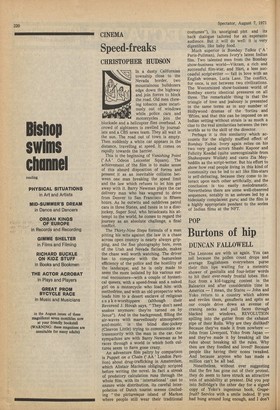CINEMA
Speed-freaks
CHRISTOPHER HUDSON
In a dusty Californian township close to the Nevada border, two mountainous bulldozers edge down the highway and join forces to block the road. Old men chewing tobacco gaze incuriously out of windows while police cars and motorcycles join the blockade and a helicopter flies overhead. A crowd of sightseers is swelled by journalists and a CBS news team. They all wait in the sun. The road out of town is empty. Then suddenly a white car appears in the distance, travelling at speed. It comes on rapidly towards the barrier.
This is the beginning of Vanishing Point (' AA ' Odeon Leicester Square). The achievement of the film is to make sense of this absurd disposition of forces and present it as an inevitable collision between one man breaking the speed limit and the law which refuses to let him get away with it. Barry Newman plays the car delivery man who has wagered to drive from Denver to San Francisco in fifteen hours. As he outwits and outdrives patrol cars in three States, and tunes in to a discjockey, Super Soul, who broadcasts his attempt to the world, he comes to regard the journey as an absolute challenge, a final conflict.
The Thirty-Nine Steps formula of a man pitting his wits against the law in a chase across open country is nearly always gripping, and the fine photography here, even of the Utah and Nevada flatlands, makes the chase well worth watching. The driver has to compete with the featureless efficiency of the police and the hostility of the landscape; and he is only made to seem the more isolated by his various surreal encounters—with a couple of hysterical queers, with a speed-freak and a naked girl on a motorcycle who load him with methedrine, and with an old prospector who leads him to a desert enclave of religious
snak e-worshippers (although their Reverend J. Hovah says, "They don't need snakes anymore; they're turned on by Jesus"). And in the background, filling the air-waves with marvellously atmospheric soul-music, is the blind disc-jockey (Cleavon Little) trying to communicate extrasensorily with the man in the car. Our sympathies are with Barry Newman as he races through a world in which both cultures seem to have gone crazy.
An adventure film paltry by comparison is Puppet on a Chain (' AA' London Pavilion) about drug-trafficking in Amsterdam, which Alistair Maclean obligingly scripted before writing the novel. In fact a streak of predatory calculation runs through the whole film, with its ' international ' cast to ensure wide distribution, its careful interpolation of Dutch tourist scenes (including "the picturesque island of Marken where people still wear their traditional costumes"), its unoriginal plot and its hack dialogue tailored for an esperanto audience. But it will do well: it is very digestible, like baby food.
Much superior is Bombay Talkie (' A ' Paris-Pullman), James Ivory's latest Indian film. Two talented men from the Bombay show-business world—Vikram, a rich and successful film-star, and Hari, a less successful scriptwriter — fall in love with an English woman, Lucia Lane. The conflict, for once, is not between two civilizations. The Westernized show-business world , of Bombay exerts identical pressures on all three. The remarkable thing is that the triangle of love and jealousy is presented in the same terms as in any number of Hollywood dramas of the 'forties and 'fifties, and that this can be imposed on an Indian setting without strain is as much a clue to the real similarities between the two worlds as to the skill of the director.
Perhaps it is this similarity which accounts for the slightly muffled effect of Bombay Talkie. Ivory again relies on his two very good actors Shashi Kapoor and Felicity Kendal (quite unrecognizable from Shakespeare Wallah) and casts Zia Moyheddin as the script-writer. But his effort to show how real people living in this kind of community can be led to act like film-stars is self-defeating, because they come to interact upon each other artificially, and the conclusion is too easily melodramatic. Nevertheless there are some well-observed sequences, notably in an ashram led by a hideously complacent guru; and the film is a highly appropriate pendant to the series of Indian films at the NFT.


































 Previous page
Previous page